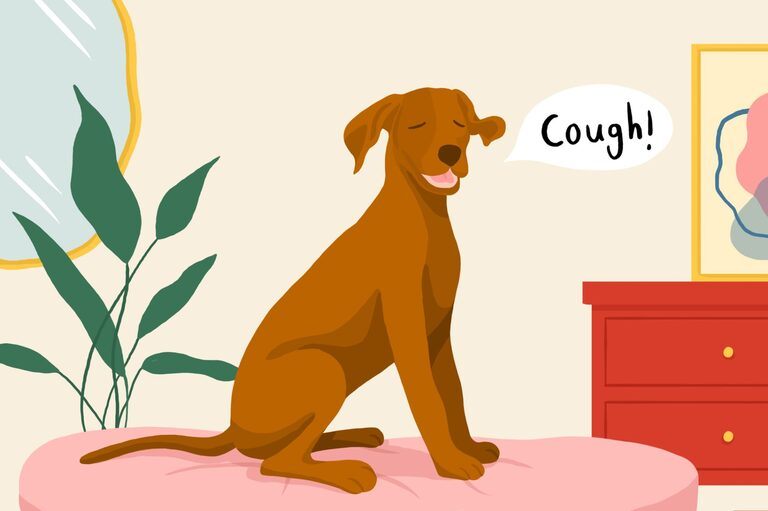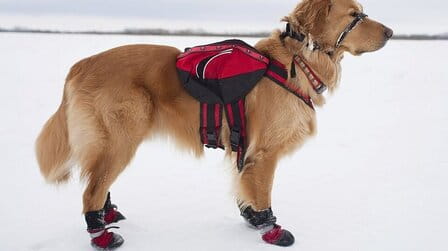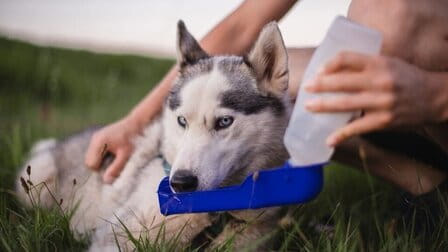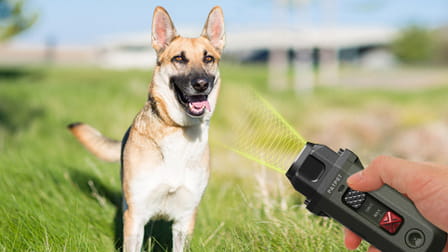Some healthy dogs will not often suffer from dog cough due to many external and internal factors thanks to a good immune system.
But once your dog's cough becomes persistent or recurrent, it could be a sign of a serious illness. This requires you not only to understand the type of dog cough but also to recognize the common causes of cough for prompt emergency care.
Below are the different types of dog coughs and common treatments you should be concerned about.
1. Types of dog coughs

Pay attention to the type of cough your dog is exhibiting. By recording the specific sound of your dog's cough, this will gauge if your dog is in an emergency.
Also, do veterinarians recommend observing how often the cough occurs and when it occurs? See the tendency to cough when lying in a certain position? Does exercise aggravate a dog's cough?
In particular, based on the different types of coughs dogs make and the sounds they make are associated with different health problems.
Dry cough (foreign body in the neck)
A dry cough sounds like a dog trying to get something out of its throat or mouth. Some symptoms of a dry cough such as kennel cough, an infectious respiratory disease in dogs, are often acquired in places where dogs gather.
Dry cough (deep cough)

A dry, deep cough like the crowing of a cock can be a symptom of a kennel cough, which is an illness that can be caused by certain bacteria or viruses. The sound of crowing is one of the signs to recognize a collapsed trachea.
Dry cough (sputum)
A dry cough, sputum production, and a wet sound are signs of flu or pneumonia. If your dog is gargling or coughing with phlegm, this indicates the dog's lower airways (or lungs). When you hear this cough, take your dog to the doctor immediately.
Coughing

A high-pitched, dog-like cough is also a symptom of a sore throat or irritation or blockage of other upper airways.
Cough at night
Your dog's only cough that occurs at night or they are asleep could indicate a serious underlying health condition. It is necessary to notify the veterinarian.
2. Causing dog coat
Kennel cough

Also known as deep cough and dog squeal. Kennel coughs are contagious, but they're not serious anyway if your dog is eating well and doing well. They might feel better in a week or more. You also don't need antibiotics or cough suppressants for your dog.
Fungal infection of dog cough

Often coughs will appear in pets due to yeast and other fungi, this is infected by contamination in dirt or through the air.
Heartworms of dog cough

Usually appears when mosquitos spread this disease. However, you do not need to worry too much, so monthly medication or a shot for 6 or 12 months can prevent this disease. This type of treatment is difficult and expensive.
Distemper of dog cough

Regarding the virus spreading in the air. When it comes to viruses, you think it's serious because of the hidden existence but can still be prevented with a vaccine.
Heart disease

Coughing is also affected by leaky valves and other problems that can weaken and thicken the heart muscle. It puts pressure on the lungs and respiratory tract. Get used to a veterinarian-approved nutritional and exercise regimen to reduce illness.
Congestive heart failure and lung problem of dog cough
It is a liquid in the lungs that causes coughing.
In terms of lungs, however, dogs sometimes develop bronchitis or pneumonia from ingesting dirt, grass seeds, or food, which can lead to airway infections.
Either way, antibiotics prescribed by your doctor can help. But still measure some rare cases like lung cancer. At this point you will need to consult with your veterinarian to decide which medication or surgery is best.
Tracheal collapse

As the rings of cartilage on the dog's trachea or trachea weaken, this can lead to tracheal collapse. It is also a condition that causes a dry cough, hoarseness, vomiting, and difficulty breathing. Very popular small dogs like pomeranians, Yorkshire terriers and chihuahuas.
Canine influenza

Also known as canine flu, is similar to human flu as a highly contagious respiratory virus.
But canine flu is caused by a different virus. Show that canine influenza is not transmitted from dogs to humans or vice versa. However, canine influenza causes coughs and presents many serious conditions.
Foreign body in throat

The cause of the cough symptoms is also due to some foreign object in the throat, when you notice that the dog is coughing, the best way to start is to check the throat carefully for any foreign bodies.
Environmental allergens
Some allergens such as dust, pollen, cigarette smoke or anything else in the environment, once the dog's immune system is weak, this is the trigger for invasion and response to the cough.
3. How to overcome dog cough

You should first make sure your dog has plenty of fresh water. They should be placed in a quiet, warm, draft-free area while resting and recuperating.
On the other hand, you can place a humidifier in the dog's resting area, because the steam will humidify the air the dog breathes. From there, it will reduce some irritation in the respiratory tract.
Moreover, steam your dog when you have the opportunity, you can leave them in the bathroom with the door closed, be careful not to be in the shower.
You can also loosen your dog's collar or use a walking harness when he or she is coughing, as pulling on the collar can irritate the neck and trachea.
4. Determining the status of dog cough

Based on the diagnosis such as clinical signs and symptoms, medical history, physical examination, diagnostic tests or accompanied by some related questions such as:
How does the cough sound?
When does the cough occur? (Night? After exercise? When your dog is lying down?)
Has your dog had shots and heartworm medication?
Where do dogs go? (Dog daycare or Boarding facility? Going on a family vacation?)
In addition, the veterinarian listens to the dog's heart and lungs. In addition, Hoi will also conduct blood tests to identify possible infections. Furthermore, your veterinarian will take X-rays of your dog's neck and chest to determine the underlying cause of the cough.
On the other hand, depending on the cause of the cough, your veterinarian may recommend antibiotics and certain other medications or treatments.
Conclusion
Dogs cough a lot for many reasons, from a simple throat clearing to a life-threatening illness.
There are many types of dog cough and many possible causes. But the best thing you can do is contact your veterinarian when you notice that your dog has a persistent cough.
In general, the conditions that cause a dog to cough are treatable, all you need to do is see the nearest veterinarian.













